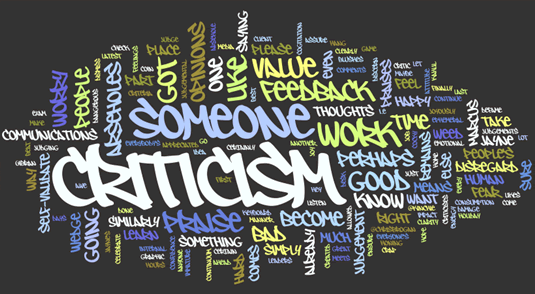
Do you feel good when someone praises you? Do you work hard to learn what they like and then ensure you continue to perform in the ‘right’ manner so as to please them?
@Kinchie let us know that Kahlil Gibran, says:
“The best of men is he who blushes when you praise him and remains silent when you defame him.”
I’m not so sure if we should be so much in awe of other people’s opinions. Why fear criticism? Why swoon over praise?
I have a quote from @ChrisBrogan by my desk, it says:
“I never worry about criticism from someone who doesn’t know much in the first place. I learn from leaders.”
http://wordle.net/. Images of Wordles are licensed
Good is bad is good is bad
I have another idea. Opinions are like arseholes – everybody’s got one. I’m my worst critic; if I like something I’ve created (perhaps a graphic, perhaps 300 words about energy consumption) and I’m certain it meets the job specification or self-set criteria, why would I worry what Jayne thinks of it?
I’m not saying I disregard Jayne’s thoughts and feelings, I’m just saying, why would I worry about them?
Jayne can’t write for toffee, and isn’t allowed near a keyboard for fear she’ll damage the space-time continuum. I can listen to her feedback, maybe tweak my opening paragraph for clarity, but I’m not going to be upset by her review.
Opinions are like arseholes, and you don’t have to be an arsehole to have one.
Similarly, why should I run home screaming with joy when Marcus praises my latest photo shoot? Marcus likes his phone-cam and his holiday shots. It’s great that he appreciated my work, certainly I hope my work has an emotional impact on people, but I’m not going to celebrate every time someone says “hey, that’s good Wedge”.
I take responsibility for what I say, what I do and what I produce. If someone says it’s ‘crap’ I don’t beat myself up over it. Nor do I spend hours self-justifying or trying to dismiss their observations / criticism as being worthless. There is value in criticism if it’s specific and related to the task.
Similarly if I’m satisfied, joyously pleased even, with something I’ve done, that doesn’t ‘make me happy’. I was already happy thank you.
Seeking validation from others is a dangerous game; we must have the confidence to self-validate.
Sure, immature people self-validate all the time, and they become cocky arseholes (there’s that word again) but I’m not telling anyone to disregard feedback. Feedback is wonderful for honing our work. Feedback let’s us know what works, and what doesn’t work quite as well.
But everyone’s got an opinion, why hang value on to these ephemeral throw-away comments that some people toss our way without cogitation?
Criticism and praise come from a place of judgement. I simply wish to discern quality, I don’t want to become judgemental, and I don’t need other people’s judgements (negative or positive) to validate that which I already value.
Want to tell me that the client has a right to judge? Please go ahead and share your thoughts. I can even ‘value’ your criticism, because I recognise that it comes from you, and remains yours. Your criticism does not become a part of me.
[Wedge]P.S. On my ‘Within Tao‘ page, the last point says:
Non-judgement and the relativity of human naming and judging
“She’s so pretty” means that someone else is ugly.
“I got an A in my exam” means someone else got an F.
“That’s a weed” is clearly a human judgement, as there’s no such thing as a weed.
(i.e. praise and criticism are two sides of the same coin.)
P.P.S. and remember, if you’re in media, communications or internal communications you’re going to receive a lot of criticism simply because you’re so visible. Check out my three part series on criticism starting with: Criticism comes your way for one reason






I’ve been reading your blog for a short while, but I haven’t felt compelled to comment on anything, specifically. Until today.
I agree that to base one’s sense of self-worth on praise or criticism is an unhealthy choice. But, on the flip side, it IS a healthy habit to let other people know when you appreciate them or their work. We are social creatures and that social interaction is part of how we maintain empathy. And goodness knows we need more of that in the world.
So: Thank you, Wedge.
I’ve quite enjoyed reading your work. And I look forward to reading more.
I think that praise and criticism should be treated differently.
Criticism, if constructive, can be a valid tool for self-reflection and improvement. However, all too often it can be the invalid opinion of someone who cares less about the person / work they are criticising and more about boosting the criticiser’s own self-worth or ego. Criticism can ‘give’ something to the person handing it out.
Praise on the other hand is given freely, and usually genuinely. There is nothing to be gained by the person who gives it; praise is a gift in my opinion and to dismiss it as irrelevant is like tossing aside an unopened gift, and can hurt the person handing it to you.
I agree that people should self-validate and not rely on the opinions of others, but I also agree with zenmom that it’s good to let people know you appreciate them. There’s enough cold hostility in this world and a kind word or two, given freely and humbly accepted, can make a difference.
I find it hard to self-vaildate in terms of “what does my work mean to others?” Of course I do know if I have worked well or not. But I am just not able to look on what I do from the OUTside – just because I am right in the middle of it.
So any feedback (criticism or appreciation) is very welcome to me because I want to learn and improve. It gives me food for thought.
What I make of it is MY decision then and will surely depend on my “re-validation” of the person it came from!
Hey Wedge, I’ve been enjoying your feed lately!
Giving and receiving praise and (constructive) criticism should be something taught to every child. By the time we realise the value of such things, we’re old and set in our ways. Every time someone opens their mouth to criticise, our natural reaction is to go on the defensive.
We don’t seek praise – but it’s welcomed.
We don’t seek criticism – but it’s needed.
Validation tells us we’re on the right path, and criticism helps us see where we may be going wrong. It’s up to the individual whether to take it on board though – and that’s the difference, as you pointed out!
We don’t HAVE to listen – but isn’t that the point of offering praise and criticism, to make something/someone you’re interested in better? It may be an opinion, but sometimes opinions should be valued, because they come from an honest source.
There was some old comedy bit (maybe Dave Allen?) about letting other cars go in when you’re stuck in traffic – if they give you a wave, you feel great, if they don’t it leaves you seething.
There’s an element of truth to that, but I’m not sure why.
If someone I don’t know, and will never meet, says they like something I’ve written, I try not to let it go to my head, because I can be equally sure that someone else didn’t like it. It is hard though.
I think, I need to try and be a little more aware of the fact that ‘Your criticism does not become a part of me’.
Hello hello!
Really good to see so many of you here, and I totally ‘get’ what you’re saying.
I could really do with splitting this stuff into three (or four):
Praise (poz); Critiques (fab feedback, neg and poz); and Criticism (and abuse).
Because I do hear what you say. Still, I never meant to suggest ignoring praise or critiques, I’m talking about having such opinions bury themselves in your soul!
For more in-depth considerations about criticism, please see my previous posts: http://kilobox.net/tag/criticism/
(honestly better articles than this one!)
See, I’ve broken my own rule: “never argue with people who comment; I’ve had my say, now let others have theirs” but it’s great to hear from you guys, thank you ever so for taking note of my little offerings.